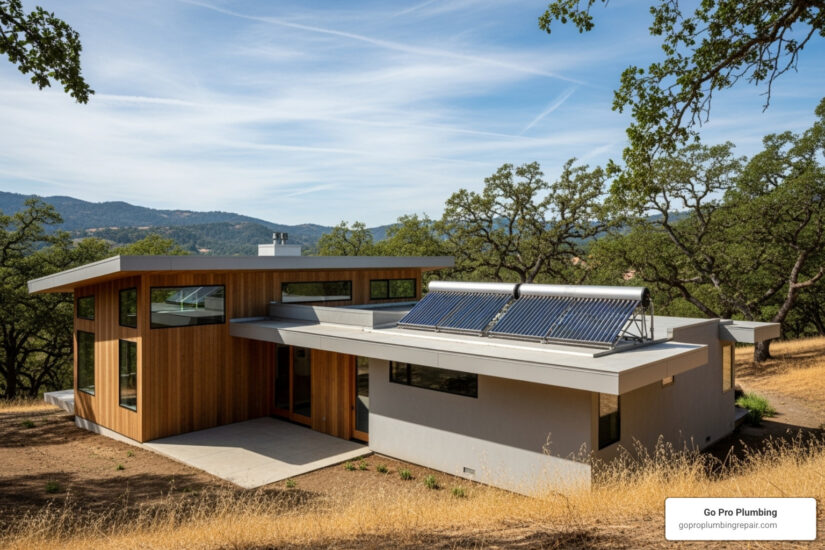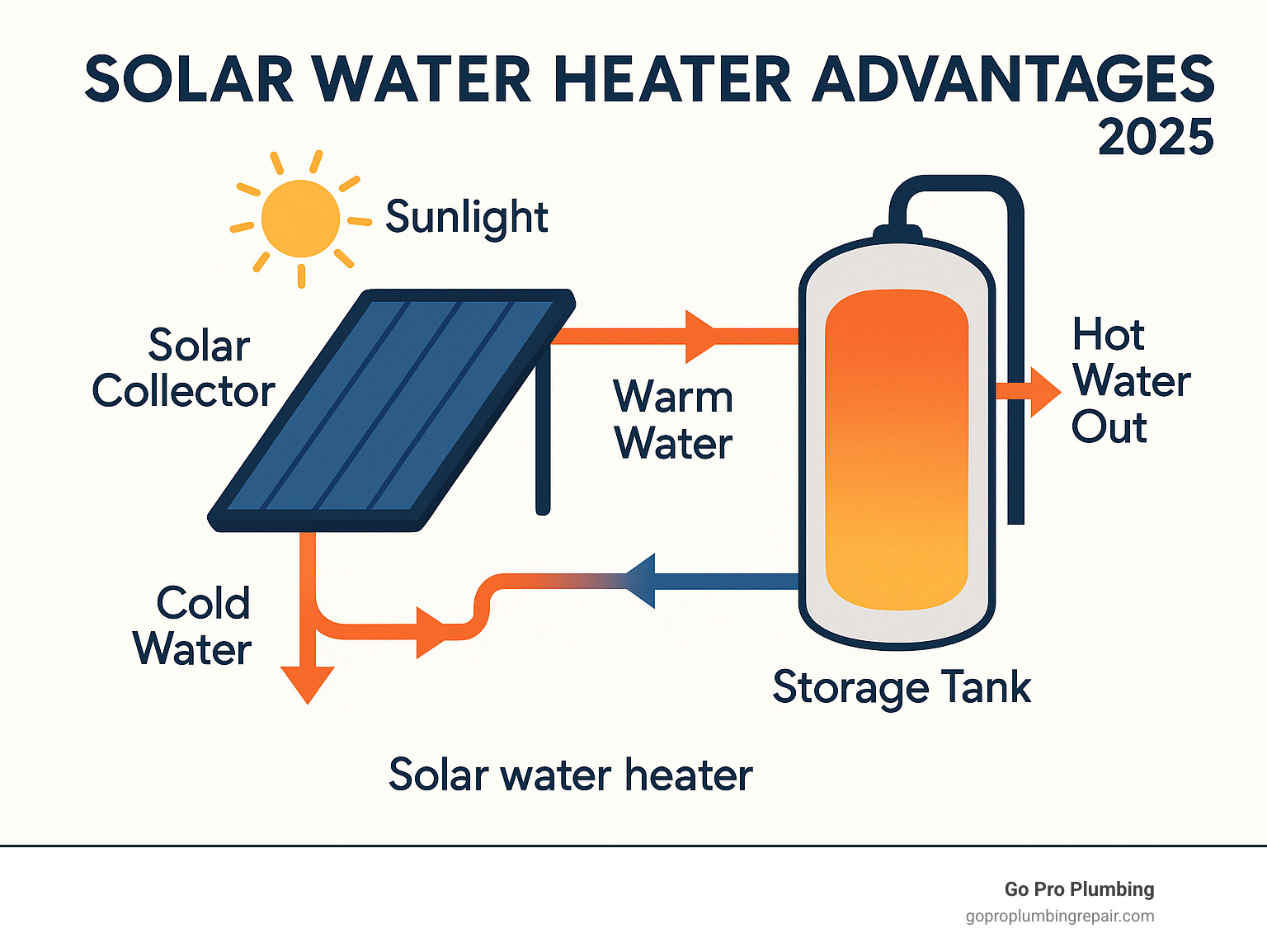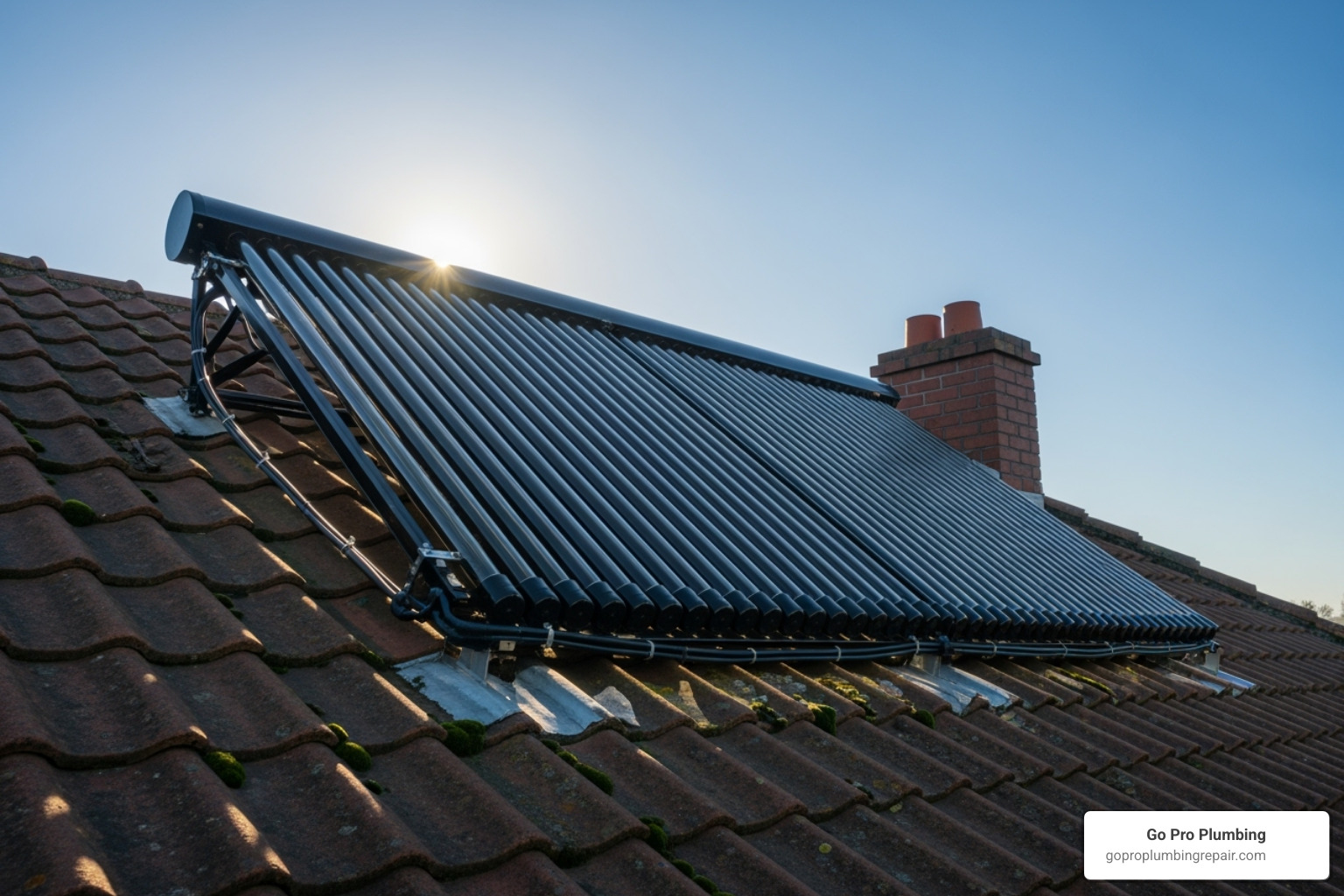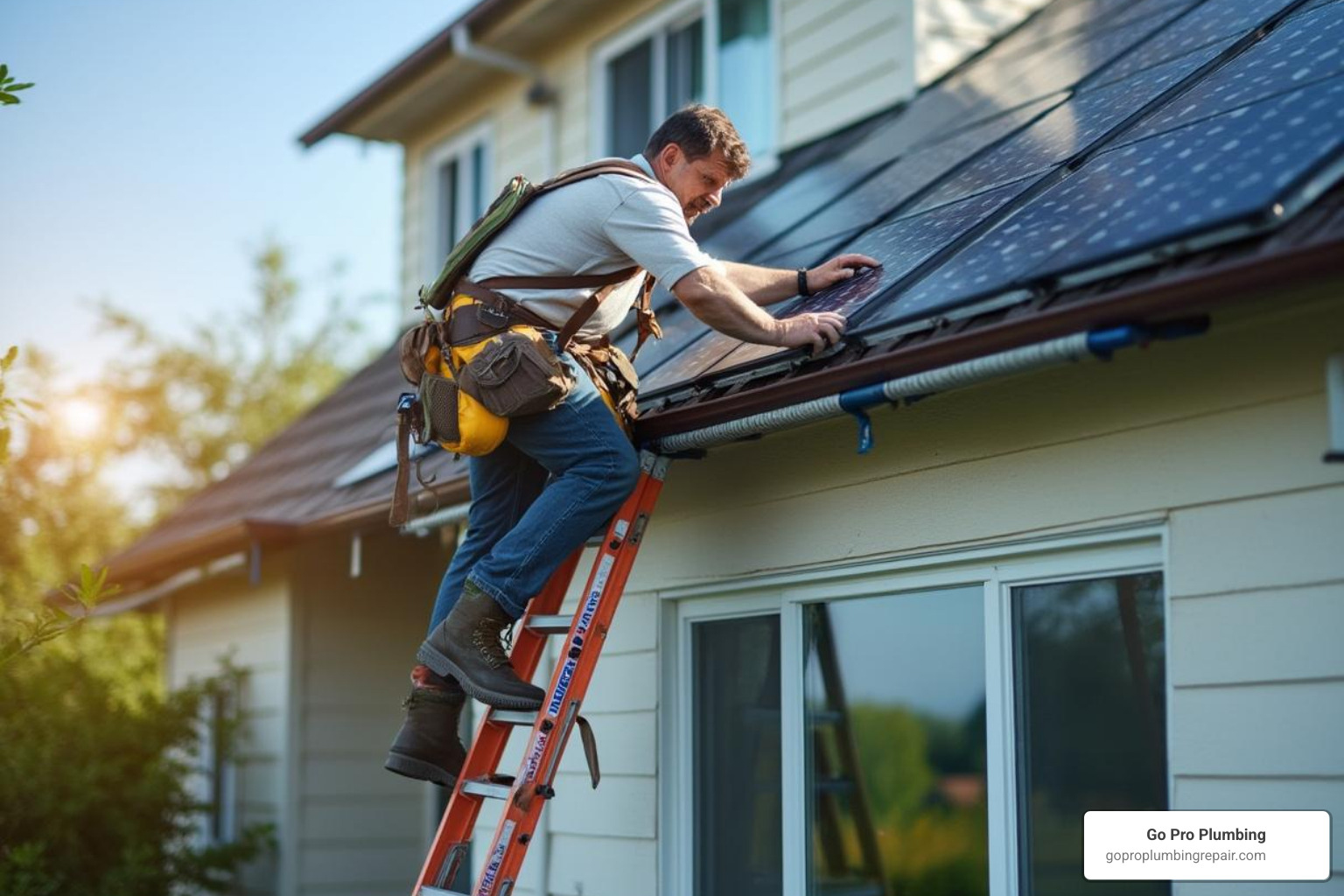The Sunny Side of Hot Water: Maximizing Solar Water Heater Efficiency
By Brian on August 11, 2025

Why Solar Water Heater Advantages Make Perfect Sense for Northern California Homes
Solar water heater advantages include cutting your water heating bills by 50-80%, eliminating up to 2 tonnes of CO2 emissions annually, and providing reliable hot water for 20+ years with minimal maintenance. Here are the key benefits:
- Massive savings: Reduce water heating costs by 50-80% on average
- Environmental impact: Zero emissions during operation, cutting your carbon footprint significantly
- Long-term durability: Systems last 20+ years, outlasting conventional water heaters
- Low maintenance: Fewer moving parts mean less upkeep and repairs
- Energy independence: Protection from rising utility costs and fuel shortages
- Property value boost: Homes with solar improvements sell for higher prices
- Tax incentives: 30% federal tax credit available through 2032
Have you ever considered how much energy it takes to heat water in your home? You may be surprised to learn that water heating accounts for 14% to 18% of your energy costs – making it the second-largest energy expense in a typical home.
With Northern California’s abundant sunshine and rising energy costs, solar water heaters offer an attractive solution. These systems use the sun’s free energy to heat your water, dramatically reducing your dependence on expensive electricity or gas.
Unlike solar panels that generate electricity, solar water heaters are specifically designed to capture the sun’s thermal energy for heating water. They’re incredibly efficient, converting up to 80% of solar radiation into usable heat energy without any external fuel requirements.

Must-know solar water heater advantages terms:
- how do solar water heaters work
- solar water heater installation guide
- environmentally friendly water heaters
What is a Solar Water Heater?
At its core, a solar water heater is a clever system that harnesses the sun’s abundant energy to provide hot water for your home. Think of it as a natural, silent powerhouse sitting on your roof, quietly changing sunlight into warmth for your showers, dishes, and laundry. Instead of relying on conventional fuels like natural gas or electricity, these systems tap into a completely free and renewable source: the sun.
The basic setup of a solar water heater includes two main components: solar collectors and a storage tank. The collectors, usually mounted on your roof, absorb solar thermal energy. This energy then heats a fluid, often a mix of water and glycol, which circulates through the system. This heated fluid then transfers its warmth to the water in an insulated storage tank, ready for your use. It’s a remarkably efficient way of reducing your utility dependence and taking control of your home’s energy consumption. For more details on how these systems work, you can check out our Beginner’s Guide to Understanding Solar Water Heater Benefits.
Active vs. Passive Systems Explained
When we talk about solar water heaters, we generally categorize them into two main types: active and passive systems. Each has its own way of getting that sunny warmth into your water tank.
Active systems are the more common choice, especially in areas like Northern California where we want consistent, reliable hot water. These systems use circulating pumps and electronic controls to move the heat-transfer fluid from the collectors to the storage tank. This allows for more precise temperature control and can be more efficient, especially in colder climates or when demand is high. They come in two main variations:
- Direct circulation systems: These pump household water directly through the collectors and into the home. They are best suited for climates where temperatures rarely drop below freezing.
- Indirect circulation systems: These systems use a non-freezing heat-transfer fluid (like a water-glycol mix) in the collectors. A heat exchanger then transfers the heat from this fluid to the household water. This makes them ideal for climates with freezing temperatures, like some parts of Northern California during winter.
Passive systems, on the other hand, are simpler and rely on natural convection to move water or heat-transfer fluid. They don’t use pumps, which means fewer moving parts and potentially lower maintenance. However, they tend to be less efficient and offer less control than active systems.
- Integral collector-storage (ICS) systems: Also known as “batch” systems, these consist of one or more black tanks or tubes in an insulated box. Sunlight heats the water directly in the tank, which is then delivered to your home. They work best in climates where freezing is rare and demand for hot water is consistent throughout the day and evening.
- Thermosiphon systems: These rely on the principle that hot water rises. The storage tank is placed above the collector, so as water in the collector heats up, it naturally rises into the tank, and cooler water from the tank flows down to the collector to be heated. While efficient, they require the tank to be installed in a higher position, which might impact roof aesthetics or structural requirements.
Understanding how passive and active solar water heater systems work is key to choosing the right solution for your home.
The Core Solar Water Heater Advantages
Ready to find why so many Northern California homeowners are falling in love with solar water heaters? The truth is, the solar water heater advantages are truly impressive. They offer so much more than just warm water – they’re a smart move for your wallet, your planet, and your peace of mind.

Think about it: when you welcome a solar water heater into your home, you’re embracing true energy independence. You’re shrinking your carbon footprint, adding value to your property, and getting a reliable system that demands surprisingly little maintenance and offers amazing durability. It’s a win, win, win!
Unpacking the Financial Solar Water Heater Advantages
Who doesn’t love saving money? Let’s explore one of the most exciting solar water heater advantages: the incredible financial boost they give your budget. Heating water uses a lot of energy in most homes. It often takes a big bite out of your monthly utility bill. But with solar, you can really cut those costs down!
Picture this: your water heating bills could shrink by a huge 50-80%! Just think about all the fun things you could do with that extra cash every month. This isn’t just a quick win; it’s a smart plan to protect yourself from rising energy prices and unexpected fuel shortages down the road. After all, sunshine is always free!
And there’s more good news for your wallet! A solar water heater can actually increase the value of your home. Research shows that homes with solar improvements often sell for more than homes without. It’s a real bonus that makes your property shine for buyers who care about the environment and want lower home expenses.
Want to see even more ways to save? Check out our tips on Water Heater Energy Savings!
Exploring the Environmental Solar Water Heater Advantages
It’s not just your wallet that benefits; our planet will thank you too! When you choose a solar water heater, you’re making a truly eco-friendly decision. These systems run with zero emissions. That means no burning of fossil fuels, no harmful gases escaping into the air, and a much smaller carbon footprint for your family.
Here’s a cool fact: a solar water heater can stop up to 2 tonnes of CO2 emissions per year from entering the atmosphere! That’s like taking your car off the road for several months. By going solar, you’re helping create cleaner air and a healthier environment for all of us in Northern California and beyond. It’s a big step towards living a more sustainable life and building a cleaner future. This fits perfectly with our dedication to Water Conservation and smart plumbing solutions.
Practical Benefits: Durability and Low Maintenance
Let’s be real: no one wants an appliance that constantly needs attention! Good news! Another fantastic solar water heater advantage is how tough and easy to care for they are. These systems are truly built to go the distance.
A well-cared-for solar hot water system can happily provide hot water for your home for 20 years or even more! That’s a lot longer than many regular gas or electric water heaters. This long lifespan means fewer replacements and less waste over time, offering incredible system reliability.
Plus, solar water heaters have fewer moving parts compared to more complicated heating systems. This means they usually need very minimal upkeep. Less fuss for you, and fewer calls for repairs. It’s almost like a ‘set it and forget it’ kind of deal, letting you enjoy consistent hot water without a constant worry.
Typical Upfront Costs and Long-Term Savings
Okay, we know what you might be wondering: ‘This sounds amazing, but what’s the price tag?’ It’s true, a solar water heater usually costs more upfront than a standard water heater. On average, a complete system might be around $9,000 before any special discounts or programs. But here’s the exciting part: this initial investment is where your big, long-term savings truly start!
As we’ve mentioned, the U.S. Department of Energy figures your water heating bills could drop by a huge 50-80%. That’s a serious cut in your monthly spending! This means that over time, the money you save on energy will actually pay for the cost of your solar water heater. How cool is that? The payback period can be different for everyone, but for most homeowners, it’s a really smart investment with a great return on investment.
How much you save exactly will depend on a few factors:
- Your climate: If you live in a sunny place, like most of Northern California, you’ll naturally see greater savings.
- How much hot water you use: The more hot water your family needs, the more you’ll save by heating it with free sunshine.
- What fuel you use now: If you’re currently paying a lot for electricity or propane to heat your water, your savings with solar will be even bigger!
Government Incentives, Tax Credits, and Rebates
Now, let’s make that financial picture even sunnier! To help more people accept clean energy, there are often amazing government incentives, tax credits, and rebates available. These can really help lower the initial cost of your solar water heater.
One of the biggest helpers is the federal Residential Clean Energy Credit. This awesome program lets you get a tax credit for 30% of what you spend on your eligible solar water heater system! This incredible offer is good for systems put in until December 31, 2032. So, it’s a perfect time to make the switch! You’ll usually claim this on your federal tax return using IRS Form 5695.
But wait, there’s more! Beyond the federal help, many states and local towns – including those right here in Northern California – also offer their own special rebates, grants, or additional tax incentives. These can cut down your out-of-pocket expenses even further. We always suggest taking a peek at resources like DSIREUSA.org to see what programs are waiting for you in your neighborhood. These incentives truly make going solar easier on your budget!
Practical Considerations: Is a Solar Water Heater a Good Fit?
So, you’re intrigued by the solar water heater advantages, but you’re wondering if it’s the right fit for your specific home and lifestyle. These are excellent questions, and we’re here to help you consider all the practical aspects.

Potential Drawbacks and How to Address Them
While the benefits are plentiful, it’s important to have a clear picture of potential challenges and how we can effectively address them:
- Sunlight dependency: Solar water heaters, naturally, rely on the sun. This means their performance can be impacted by cloudy days or periods of low sunlight.
- Solution: Nearly all solar water heater systems include a conventional backup heater (electric or gas) to ensure you always have hot water, even on the gloomiest of days.
- Upfront investment: As discussed, the initial cost is higher than traditional water heaters.
- Solution: Federal tax credits and local rebates significantly reduce this cost, and the long-term energy savings lead to a favorable payback period.
- Roof suitability: You need adequate, unshaded roof space, ideally facing south, for the solar collectors.
- Solution: Our experts at Go Pro Plumbing will conduct a thorough site assessment to determine the best location and angle for your collectors. If roof space is an issue, ground-mounted systems can sometimes be an option.
- Structural integrity: The weight of the collectors and a larger storage tank needs to be supported by your home’s structure.
- Solution: We ensure professional installation that takes into account your roof’s structural capacity, guaranteeing safety and compliance with all building codes.
Solar Thermal vs. Solar PV: What’s the Difference?
It’s a common point of confusion, but solar thermal (for water heating) and solar photovoltaic (PV) systems (for electricity generation) are distinct technologies. While both use sunlight, they do very different jobs:
- Solar thermal for heat: Solar water heaters fall into this category. They capture the sun’s thermal energy to directly heat water. Their efficiency is measured by how much solar radiation they convert into heat.
- Solar photovoltaic (PV) for electricity: These are the more commonly recognized “solar panels” that convert sunlight into electricity. This electricity can then power your entire home, including your electric water heater if you have one.
The efficiency and space requirements differ too. Solar thermal collectors are highly efficient at heating water, often converting a greater percentage of solar energy into heat than PV panels convert into electricity. They are purpose-built for heating water, making them incredibly effective at that specific task. While a PV system could power an electric water heater, a dedicated solar thermal system is often a more efficient and cost-effective way to heat water directly from the sun.
Solar vs. Traditional Water Heaters
To truly appreciate the solar water heater advantages, let’s compare them directly to common electric water heaters.
| Feature | Solar Water Heater | Electric Water Heater |
|---|---|---|
| Initial Cost | Higher (avg. $9,000 before incentives) | Lower (avg. $500 – $2,000) |
| Operating Cost | Very low (50-80% reduction in water heating bills) due to free solar energy | High, dependent on electricity rates and usage |
| Lifespan | Long (20+ years, often longer) | Shorter (10-15 years) |
| Environmental Impact | Very low carbon footprint, zero emissions during operation, uses renewable energy | Higher carbon footprint (depends on electricity source, often from fossil fuels) |
| Maintenance | Low (annual check, fluid replacement every 3-5 years) | Low (some anode rod checks, flushing) |
| Energy Source | Sun (free and renewable) | Electricity grid (cost varies, can be non-renewable) |
| Energy Independence | High, reduces reliance on utility companies | Low, completely reliant on grid electricity |
| Backup System | Typically required for consistent hot water during cloudy periods or high demand | Inherently self-sufficient (as long as electricity is available) |
As you can see, while the upfront cost is a consideration, the long-term savings, environmental benefits, and durability of a solar water heater make it a compelling choice. Traditional storage water heaters simply can’t compete with the sustainability and independence offered by solar.
Frequently Asked Questions about Solar Water Heaters
We love chatting with homeowners about solar water heaters! Over the years, we’ve noticed the same thoughtful questions come up again and again. Let’s tackle the big ones that most Northern California homeowners want to know about.
Can a solar water heater provide 100% of my hot water?
Here’s the honest answer: while solar water heaters are amazingly efficient, they typically handle about 50-80% of your annual hot water needs. Think of it like having a reliable friend who shows up most of the time, but sometimes needs a little backup.
The percentage really depends on the season and Mother Nature’s mood. During those gorgeous California summer months, your system might practically cover all your hot water needs – it’s like having unlimited hot showers courtesy of the sun! But when winter rolls around or we get those occasional stretches of cloudy weather, the solar contribution naturally drops.
This is exactly why we always recommend having a backup system in place. It’s not a weakness of solar technology – it’s just smart planning! We’ll make sure your solar water heater works hand-in-hand with your existing electric or gas water heater, or we can install a fresh backup unit. This way, you’ll never have to worry about that dreaded cold shower surprise, no matter what the weather’s doing outside.
How does a solar water heater affect my roof?
When installed properly by experienced professionals (like our team), a solar water heater actually has a surprisingly minimal impact on your roof’s structure and appearance. The collectors are designed to be sleek and low-profile – many of our customers say they look like modern skylights rather than bulky equipment.
We’re talking about collectors that are typically only about 4 to 6 inches thick, and we can mount them flush with your roofline for a clean, integrated look. Your neighbors might even compliment you on the modern upgrade!
Now, here’s where our professional installation really matters. We start every project with a thorough assessment of your roof’s structural capacity. We carefully calculate weight distribution and use proper mounting techniques to ensure everything is rock-solid. Our specialized flashing and sealing methods keep your roof completely watertight – no worries about leaks down the road.
If you’re curious about our meticulous approach to installation, take a look at our Solar Water Heater Installation Guide. We take pride in creating installations that not only work beautifully for decades but also look fantastic on your home.
What maintenance does a solar water heater require?
Here’s one of our favorite solar water heater advantages to share with customers – these systems are refreshingly low maintenance! Since they have fewer moving parts than many other heating systems, there’s simply less that can go wrong. It’s like owning a reliable pickup truck instead of a finicky sports car.
That said, a little attention goes a long way toward keeping your system running at peak performance. We recommend a simple annual inspection where we check the overall system health, look for any potential issues, and make sure all components are humming along nicely. Think of it as an annual physical for your water heater.
For active systems that use heat-transfer fluid, the antifreeze solution typically needs refreshing every three to five years. This keeps the fluid’s protective properties strong and maintains peak efficiency. Occasionally, you might want to give the collector surfaces a gentle rinse to remove any dust or debris – nothing more complicated than hosing off your car.
The bottom line? It’s truly a minimal time commitment for such a significant return on investment. Most of our customers are amazed at how little attention their solar water heater needs compared to the substantial savings and comfort it provides year after year.
Conclusion: Tap into Solar Savings with Expert Help
Well, we’ve certainly covered a lot of ground, haven’t we? It’s clear that the solar water heater advantages aren’t just a fleeting trend; they’re a smart, sustainable choice for modern homes. Imagine truly tapping into that abundant Northern California sunshine to heat your water, saving you a substantial 50-80% on your energy bills each month. That’s money back in your pocket!
Beyond the financial perks, choosing solar means embracing an eco-friendly lifestyle. You’ll be actively shrinking your carbon footprint, reducing up to 2 tonnes of CO2 emissions annually. And let’s not forget the practical side: these systems are built to last, offering 20+ years of reliable, low-maintenance hot water. It’s about gaining true energy independence and enjoying consistent comfort for decades to come.
Here in Northern California, with our fantastic climate, a solar water heater just makes sense. And when you’re ready to make the switch, Go Pro Plumbing is here to make it easy. We pride ourselves on being your trusted local experts, understanding the unique needs of homes in Sacramento, Rancho Cordova, and beyond. Our commitment to outstanding customer service and same-day service means you’ll always have a reliable partner by your side.
Ready to brighten your home and your budget with the power of the sun? Don’t let those amazing solar water heater advantages pass you by. Let the friendly team at Go Pro Plumbing guide you through every step, from choosing the perfect system to professional installation and ongoing support.
Contact us for professional Solar Water Heaters installation and service today. We can’t wait to help you experience the sunny side of hot water!
